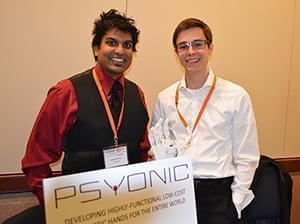The 21st: The Consequences Of The Political Divide
Welcome to our first edition of The 21st Show! On March 14, 2016, we talked about our country's political divide and the consequences of what that means for Illinois. We also spoke with two student entrepreneurs who have co-founded an Illinois company working to create a new generation of prosthetic hands for amputees around the world.
What We Hear Versus What People Say When Talking About Politics
Friday night in Chicago we saw an example of how bitter this presidential race has become. Protests between supporters and detractors of Republican Presidential Candidate Donald Trump turned violent, Trump cancelled his planned rally, and all weekend we’ve been hearing accusations fly about who started what - and how divided we are as a country politically.
This polarization is something everyone from political scientists to The White House are worried about. And of course - it’s not just national politics. We’re seeing this play out right here in Illinois with an unprecedented stalemate between our Democratic legislature and a Republican governor.
“I think there’s a broader worry that if we can’t have normal conversations, if we can’t listen to each other, then our political process just doesn’t function.”Greg Jaffe
This issue of what we hear versus what politicians say was the topic of a recent Washington Post story by White House correspondent Greg Jaffe.
Ironically, as a country, political scientists don’t think we’re as divided ideologically as we’ve been in the past. But, we are more distrustful - and angry.
“I think there’s a broader worry that if we can’t have normal conversations, if we can’t listen to each other, then our political process just doesn’t function,” said Jaffe.
Joe Yun leads the University of Illinois’s Social Media Analytics Lab. (We’ll be working with the lab to help provide social media analytics, especially in regards to politics this election season.)
He analyzed the tweets of 60 supporters of Donald Trump and Bernie Sanders and found that the supporters were more alike than you might expect.
We also talked with Kristen McQueary with the Chicago Tribune Editorial Board and Maria “Nena” de los Angeles Torres about how this question of perception versus reality and the resulting polarization is playing out here in Illinois. Torres is the executive director of The University of Illinois – Chicago’s InterUniversity Program for Latino Research.
Yun said that he thinks social media can enhance the divide, but it can also help close it.
He says we can surround ourselves with people ideology like us or we can reach other influential people and seek out conversations with people who don’t think the way we do “and just say ‘hey, can I just join this conversation and can I potentially bring some different thoughts into this so that we can converse about this reasonably.’”
For a list of all the races at stake in the Tuesday primary, visit our Voter’s Edge Guide.
Student Entrepreneurs Develop Low-Cost Prosthetic Devices

Patrick Slade and Aadeel Akhtar co-founded PSYONIC with the goal of bringing their research on low-cost 3D-printed prosthetic devices to the public.
It’s not often that a college student lands on a Forbes 30 Under 30 List. But engineering undergraduate student Patrick Slade got there with his company, PSYONIC, which he co-founded with MD/PhD student Aadeel Akhtar. Both attend the University of Illinois and joined us in the studio for the show today.
Modern-day prosthetic devices can be life-changing for people missing a limb. But for the 80 percent of amputees who live in developing nations, these devices - which can cost tens of thousands of dollars - remain simply out of reach. Aadeel and Patrick have created a low-cost 3D-printed prosthetic hand that they are hoping will be accessible to more people. The latest prototype includes touch sensors that provide sensory feedback to users so that they can “feel” what they are doing - which is important to ensure that when they grab a fragile object, like an egg, that they don’t crush it.
PSYONIC is working with a local non-profit, Range of Motion Project, to bring the devices to Ecuador and test them out on patients. Aadeel leaves for Ecuador tomorrow and Patrick will take a trip there this summer. Patrick is also planning a TEDx talk about PSYONIC’s 3D-printed prosthetics at the University of Illinois next month.
Our Promise To You
Thanks for listening to our debut of The 21st. We hope today has given you an idea of what we want to accomplish with this show. We think it’s crucial - now, more than ever, for all of us to be not just talking, but listening to each other.
Our promise to you is that every time we’re on air, we’ll bring you the news, culture and stories that matter to Illinois. This is your chance to hear voices from all across the state. We want to serve as your connection to the people, places, communities and most importantly, conversations that are happening here.
We’re called The 21st - by the way, not just because we’re the 21st state, but because we want this to be 21st century radio.
You can always find us online - that’s where you’ll get a heads up about what we’re working on. Here are all the ways to connect to us, on Facebook, Twitter, or give us a call! Our voicemail number is (217) 300-2121.

